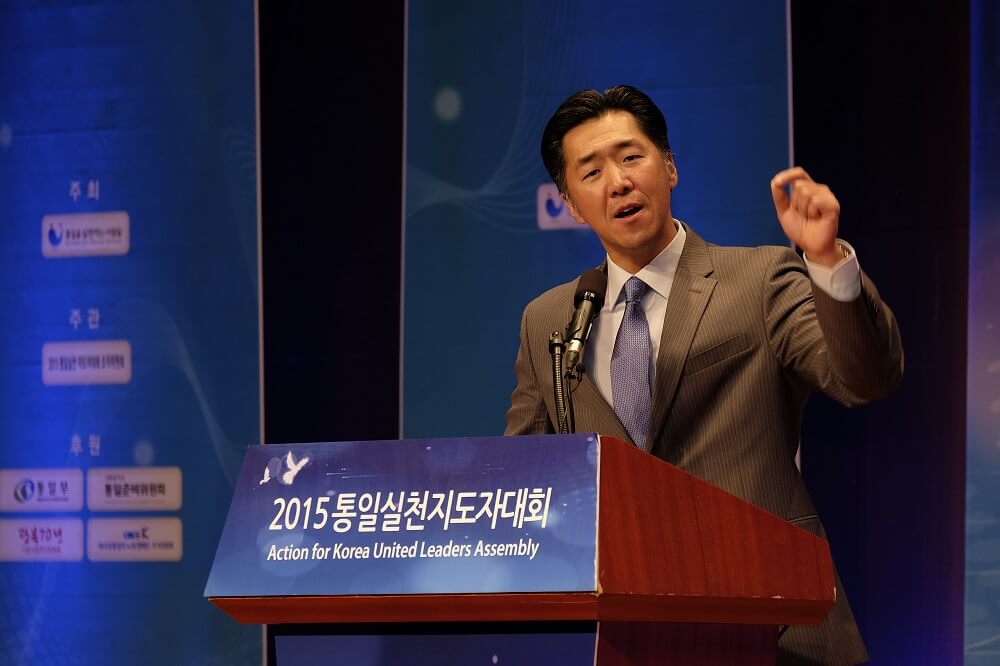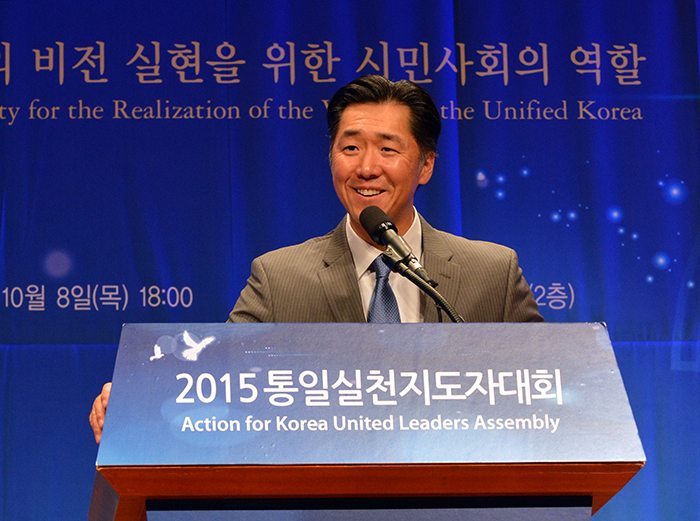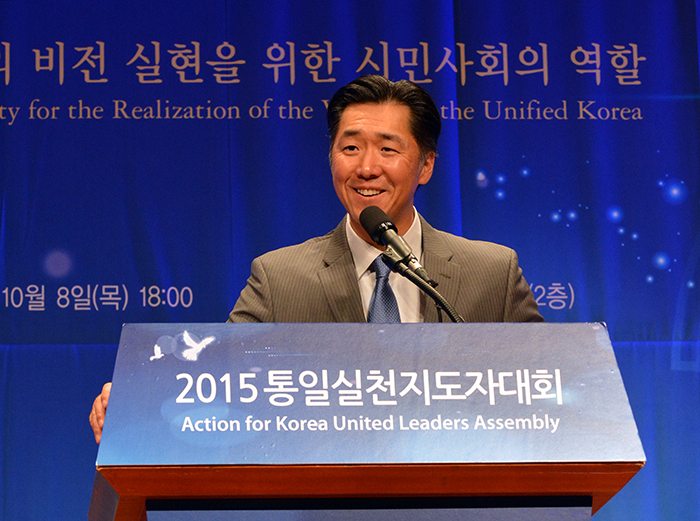Before an audience of 730 civil society organizations attending the Action for Korea United Leaders Assembly 2015 in Seoul, Dr. Hyun Jin Moon delivered a keynote address at the InterContinental Hotel.
He emphasized that the identity of the Korean people is rooted in its founding philosophy, Hongik Ingan. The western nations claim that, a few hundred years ago, they created the noble ideals that we uplift today such as fundamental freedoms and human rights. Yet, the Hongik Ingan ideals, that existed since Korea’s founding 5,000 years ago, profess those exact same points.
Dr. Moon goes further to propose that the ideals of Hongik Ingan are not just for the Korean people, but for the entire world. This is the role he envisions a unified Korea can play on a regional and global level, that he calls, “The Korean Dream”.
Action for Korea United is a coalition of over 730 civil society organizations committed to advancing such a vision for peaceful re-unification on the Korean Peninsula.
The annual assembly highlighted the important grassroots efforts being done to engage the Korean public on this significant issue.
The following address was delivered at the Action for Korea United Leaders Assembly hosted in Seoul, Korea on October 8, 2015.
Originally I came prepared with a written speech in English. However, being here with all of you, it feels like I am with family that I have not seen in a while. Instead I would like to speak to you in Korea from my heart. My Korean is a little lacking because I grew up in America so I may occasionally have to use English. Would that be okay?
I am deeply moved to be here, because the vision of unification is not just my dream; it was my father’s dream and my great-great uncle’s dream. If I think about it, this dream is our shared legacy as the Korean people.
For us, unification is not just a concept; it is part of our identity.
 In 2010, when I first began working on the issue of Korean unification, I visited Korea to meet with the highest leaders: political leaders, business leaders, NGO leaders, and academics. I was told the Korean people were no longer interested in unification – that the issue was outdated. The older generation may still have been interested, but the younger generation in particular was not. I was told that if I wanted to build a foundation in Korea, I would have to focus on a different issue.
In 2010, when I first began working on the issue of Korean unification, I visited Korea to meet with the highest leaders: political leaders, business leaders, NGO leaders, and academics. I was told the Korean people were no longer interested in unification – that the issue was outdated. The older generation may still have been interested, but the younger generation in particular was not. I was told that if I wanted to build a foundation in Korea, I would have to focus on a different issue.
However, in my heart, I knew that this was not the case.
The Moon family, including my late father and generations preceding him believed that the Korean nation, the Korean people, were given a special mandate, a mission from God. I believe this, too.
You can find the basis for this conviction if you study Korean history. I truly believe that the vision of Hongik Ingan is not just part of our ancient history, but a mandate bequeathed by Heaven to our people. What is that mandate?
It is that the Korean people should live for the benefit of all humanity. This content is quite profound; I extensively expound upon Hongik Ingan in my book.
As a history major during my time in university, I studied many of the world’s histories. During that time, I could see that among the many ancient civilizations, Korea stands out as a nation that upheld a high ideal like the philosophy, the vision of Hongik Ingan.
Having studied in America, I understand the Western ways of thinking. In particular, it is taught and believed that the concept of fundamental freedoms and human rights began in the West.
Of course, this reasoning comes with little knowledge of the history of Korea. It perceives Asia as backwards, especially in terms of fundamental freedoms and fundamental human rights. Yet, there was a nation in Asia that strove for the highest aspirations of human life by recognizing the sanctity of our common humanity. Not just our national humanity, but our common humanity. That nation was Korea.
When I shared the vision of Hongik Ingan with U.S. congressional leaders who came to GPF conferences and events, and explained why Korea resonates with the values that America represents, especially in lieu of issues such as human rights and fundamental freedoms, they were blown away. What amazed them was that the philosophy of Hongik Ingan existed 5,000 years ago in an ancient civilization in the heart of Asia. When I wrote The Korean Dream, I specifically wrote it for an international audience, especially a Western audience.
As I have shared these ideas with many foreign dignitaries, they have been moved.
During this conference, I was asked by the owner of one of the largest media entity groups in India to write an opinion piece on where the ideas of freedom and human rights came from because he recognized the contribution of Korea, through the vision of Hongik Ingan in enlightening not only Asia, but the world. His newspaper is the most influential newspaper in India, and his entire media entity reaches 250 million households in the nation of India.
Why is this important? It reminds us that the ideal of Hongik Ingan is not just meant to move the Korean people, it is meant to move the entire world and all humanity.
With the end of the Cold War paradigm, how can we as the Korean people in the North and South and the entire world address the issue of unification? The question of unification is becoming more and more pressing. We first need to establish the vision of Hongik Ingan in order to continue to help our nation.
 I called that vision the Korean Dream. What is the Korean Dream?
I called that vision the Korean Dream. What is the Korean Dream?
It is not simply the hope and promise of a peaceful reunification of North and South Korea. It has the hope and promise of the people of Asia as well as the rest of the world who are looking for the type of leadership needed to bring peace to our troubled humanity. That is why this is the time in which we need to dream big.
This is a time in which we need to dream the Korean Dream!
If the Republic of Korea can first become the owners of the Korean Dream, then North Korea will follow. If North Korea follows, North-South unification will come. If North-South unification comes, the entire world will look to Korea’s example to follow. This is my 100% conviction!
I hope you understand the centrality of our work at hand.
Every single one of you is an owner of the Korean Dream. In the opening of the first chapter to my book, The Korean Dream, I added an idea by Genghis Khan:
“If one person dreams a dream, it is but a dream. If everyone dreams the same dream, it will become a reality.”
All of you here are part of civic organizations. All of you represent the Korean people.
I’ve lived a long time in the United States, so it’s possible that I am not fully aware of the situation here; however, I am slightly skeptical of political leadership.
This is because in a democracy, to move the political leadership, you first need to move the citizens. If the Korean people move, then the whole country will move. If all of you make this dream your own in every small and large way; if you dream the dream for this movement for unification, then a tremendous transformation will take place.
If you go out with this hope and spirit, the entire Korean nation, North and South, will shake.
A new tsunami will come!
Thank you very much!

